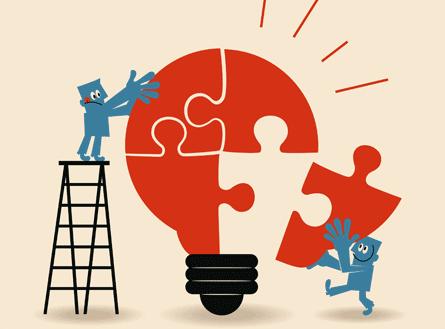8 Basic Psychological Processes

A resource that we have when it comes to adapting to the world around us is our behavior. This allows us to modify our environment and our reality to adapt to what happens in our lives. We know that our behavior is mediated by internal mental processes. But what are those mental processes?
The 8 basic psychological processes are: (a) perception, (b) learning, (c) language, (d) thought, (e) attention, (f) memory, (g) motivation, and (h) emotion. Let’s look at each process individually. All are closely related to each other. Although they maintain their terminological independence, many could not exist without the others. It is better to understand this distinction as an artificial classification that facilitates scientific work.
Perception
Perception is responsible for us having an “image” of the reality that surrounds us. It processes the information we receive from the external stimuli of our senses.
Perception is responsible for organizing and giving meaning to all sensory stimulus. The function of this is obvious: knowing the environment around us allows us to move and interact with it. These are basic and necessary skills to achieve an efficient adaptation.
Learning
This is how we modify and acquire knowledge, abilities, skills, behaviors, etc. It works through what happened in the past. Learning also helps us relate our behaviors with their consequences. It is closely related to memory.

The study of learning is given largely to the field of behaviorism. This gave us theories of classical and operant conditioning to explain how we learn.
This process is useful because it allows us to vary our repertoire of behaviors according to what happened in the past. It allows us to respond more adaptively in present and future situations.
Language
The human being is a social being. That’s why language is such an important process. It gives us the ability to communicate with others. This communication, in the case of humans, is carried out through a complex symbolic code, or language. The complexity of our language allows us to accurately describe almost anything, be it past, present, or future.
The usefulness of this process comes from our need to maintain complex social relationships that allow us to survive in a hostile environment. Language allows us a mode of communication broad enough to maintain human societies.
Thought
This is a complex process that psychology defines as the process in charge of transforming information to organize it and give it meaning. The study of thought began with Aristotelian logic. However, this was not an effective form of analysis, because the human being does not reason with logic.
Reasoning is a quick, but somewhat imprecise process that allows us to act effectively in our environment.
The function of thought is a controversial issue. This is partly due to the existing terminological confusion around it. The most accepted idea is that its objective is to act as a control mechanism in the face of situations presented to us.

Attention
Attention focuses our resources on a series of stimuli while ignoring the rest. We receive a large number of stimuli all at once and we cannot attend to all at the same time.
The attention process is adaptive because, if it did not exist, we would find ourselves overwhelmed by stimuli. We would not know which to react to. It is paradoxical that the self-imposition of a cognitive limitation implies an evolutionary adaptation, but it’s true.
Memory
Memory allows us to encode information for future storage and retrieval. This is an essential process and closely related to all other processes.
Memory allows us to remember explicit information such as the capital of France or procedural information like how to ride a bike. Memory exists because it is really useful to have information about our past experiences at our disposal. This allows us to make guesses about the future and act on them. Without this process, the other basic psychological processes would not exist, since all are strongly supported by memory.
Motivation
Motivation is responsible for providing the body with resources to perform a behavior. It is the process in charge of activating the body and putting it in the ideal state. Another important aspect of motivation is direction. Not only does it prepare the body, it is also responsible for directing behavior among possible options.
The function of motivation is to get the individual to direct their behavior toward their goals and objectives. It prevents them from standing still. This process is closely related to emotion and learning.

Emotion
Emotions are reactions to external stimuli. They allow us to guide our behavior and act quickly in response to the demands of our environment. Emotions have three components:
- Somatic: the physiological changes provoked by emotion
- Behavioral: the spectrum of behavior triggered by an emotion
- Feeling: the subjective experience of the individual
Emotion manages our behavior in a fast and effective way. Most decisions lack enough importance for us to spend a lot of time on. That’s where emotion comes in. It is important to understand that any decision is mediated by our emotions to some degree.
In this article, we have exposed the basic processes in a very superficial way. They are all subjects of extensive study with many more details than we could include here. The intensive study of each of them gives us the basic information to understand the behavior and mental processes of the human being.
This text is provided for informational purposes only and does not replace consultation with a professional. If in doubt, consult your specialist.








